Artificial intelligence (AI) has become an integral part of our daily lives, revolutionizing the way we interact with technology and shaping our future. From the moment we wake up until we go to bed, AI is present in various aspects of our routine, making our lives more convenient, efficient, and interconnected. From voice assistants like Siri and Alexa to recommendation algorithms on streaming platforms like Netflix, AI is constantly at work, providing us with personalized experiences and enhancing our daily activities.
Through its advanced capabilities, AI has greatly improved the efficiency and accuracy of tasks that once required human intelligence. From autonomous vehicles that can navigate and make decisions on the road to virtual assistants that can understand and respond to our queries, AI technology continues to develop and evolve, becoming an indispensable part of our lives.
But what exactly is AI? AI refers to software programs that mimic human intelligence, enabling them to perform tasks such as perception, reasoning, learning, and decision-making. It encompasses various technologies and approaches, including rule-based systems, machine learning, neural networks, and deep learning. These different techniques allow AI systems to process and analyze vast amounts of data, learn from patterns, and make intelligent decisions.
AI is transforming numerous industries, from healthcare and manufacturing to transportation and education. It is helping us diagnose diseases more accurately, optimize production processes, revolutionize transportation systems, and personalize learning experiences. As AI continues to advance, it has the potential to radically transform the way we live, work, and interact with the world around us.
In this article, we will explore the various applications of AI in daily life and examine how this technology is shaping our future. We will delve into key industries where AI is making a significant impact, discuss the opportunities and challenges it presents, and explore the future trends and advancements that we can expect in the field of AI.
Key Takeaways:
- Artificial intelligence (AI) is a technology that simulates human intelligence and performs tasks like perception, reasoning, learning, and decision-making.
- AI is present in various aspects of our daily lives, from voice assistants to recommendation algorithms on streaming platforms.
- AI has the potential to transform industries such as healthcare, manufacturing, transportation, and education.
- While AI presents opportunities for increased efficiency and convenience, it also poses challenges such as job displacement and ethical concerns.
- The future of AI holds promising advancements in areas like reinforcement learning and generative adversarial networks.
What is Artificial Intelligence?

Artificial Intelligence (AI) refers to software programs that simulate human intelligence and perform tasks requiring human-like thinking and decision-making. It encompasses various capabilities such as perception, reasoning, learning, and problem-solving.
AI technologies are designed to analyze vast amounts of data, extract meaningful insights, and provide accurate and efficient solutions. These technologies have the potential to revolutionize industries and drive innovation in various sectors.
One prominent type of AI is generative AI, which is capable of creating new content. An example of generative AI is ChatGPT, an advanced language model that can generate human-like responses in complete sentences. It can serve as a virtual assistant, answering questions, engaging in conversations, and even composing songs or poems.
As AI continues to evolve and advance, its ability to emulate human intelligence becomes more sophisticated, presenting exciting possibilities for the future of technology and human interaction.
How AI Is Shaping the Future
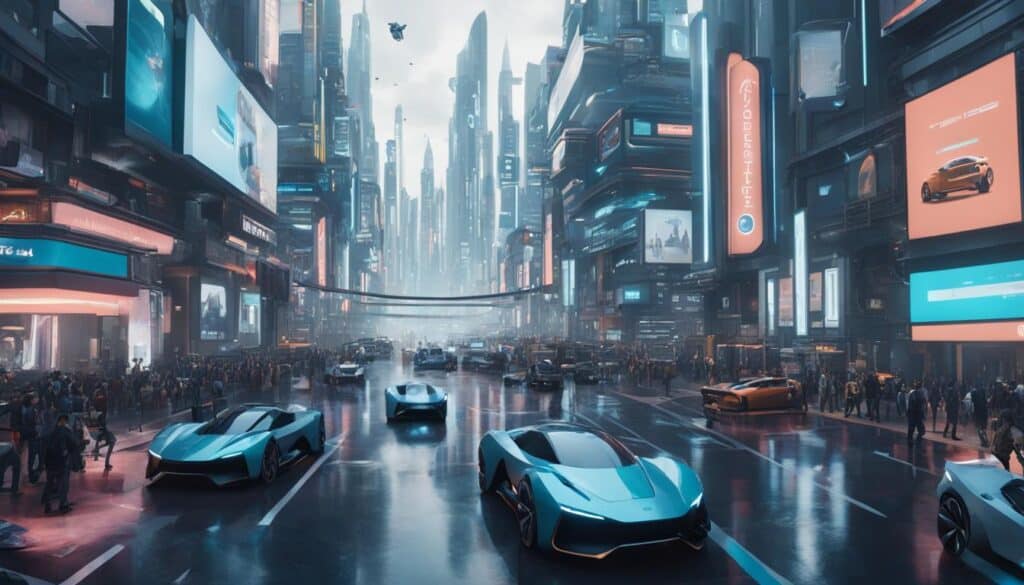
As the world continues to advance in technology, the role of artificial intelligence (AI) cannot be underestimated. AI is believed to have a profound impact on society and shape the future in various ways. One of the key areas where AI is expected to excel is in scientific research and innovation. With the help of AI, scientists are discovering new drugs and treatments faster than ever before, potentially revolutionizing healthcare.
Moreover, AI is anticipated to enhance efficiency and productivity in organizations across industries. By automating repetitive and time-consuming tasks, AI can free up valuable human resources to focus on more creative and complex endeavors. This increased focus on creativity can lead to new discoveries, innovations, and advancements.
AI has already made significant strides in manufacturing, improving industrial processes and performing heavy lifting tasks with ease. However, its potential extends beyond physical labor. AI has the capability to tailor content, evoke emotional responses, build trust, and provide new ideas. These applications can transform how businesses engage with customers, leading to more personalized and satisfying experiences.
“AI has the potential to revolutionize our society by driving new trends and shaping the future of technology. From healthcare to manufacturing and beyond, the possibilities are limitless.”
In addition, AI can play a crucial role in addressing complex societal challenges. By leveraging AI technology, cities can be optimized for sustainability, traffic conditions can be predicted, and environmental issues can be tackled more effectively.
Overall, the future of AI is vast and promising. The continuous advancements in AI technology will undoubtedly bring forth new tech trends and shape the way we live and work. Embracing AI and exploring its full potential will pave the way for a brighter future.
Jobs Created by Artificial Intelligence
A study conducted by Open AI revealed that the rise of generative artificial intelligence (AI) is expected to impact approximately half of the tasks currently performed by 49% of the global workforce. While this may raise concerns about job displacement, it also presents exciting opportunities for the creation of new roles in various industries.
One area that will see significant growth is data science, where professionals will be needed to analyze and interpret the vast amounts of data generated by AI systems. Machine-learning engineering will also emerge as a crucial field, as specialists will be required to develop and maintain AI models and algorithms.
Furthermore, the expansion of AI will drive the demand for skilled software developers who can design and build AI applications tailored to specific business needs. Another promising field is UX design, with the need for experts who can craft seamless and intuitive user experiences in AI-driven products and services.
In specialized industries like healthcare, AI will play a pivotal role, resulting in the creation of job opportunities for healthcare professionals who specialize in AI applications. Roles such as prompt engineers, AI trainers, AI auditors, and machine managers are also expected to emerge as essential components of the growing AI ecosystem.
The Evolution of AI
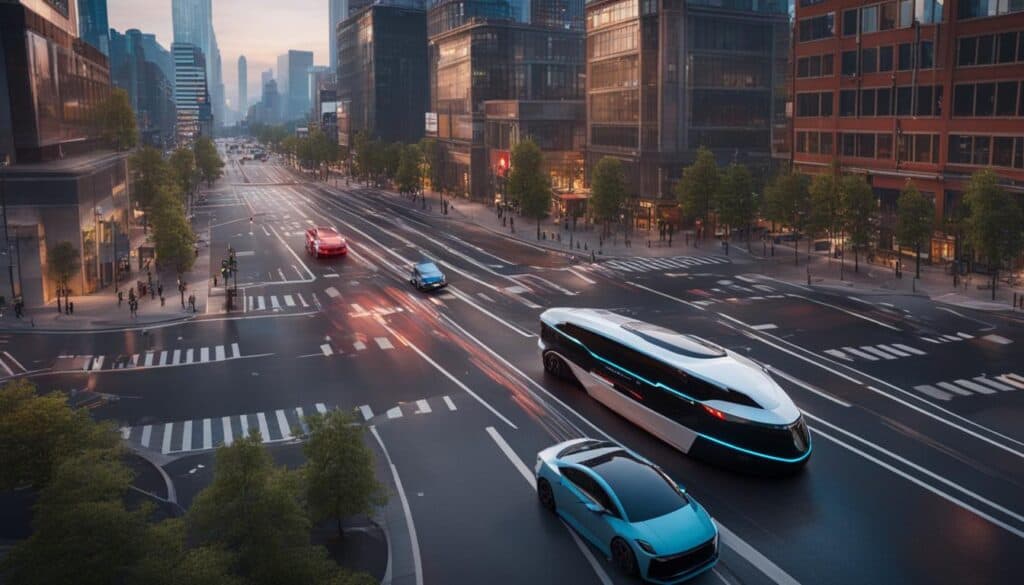
AI has come a long way since its inception, undergoing significant advancements in model- and algorithm-based machine learning. These developments have empowered AI systems to focus on crucial areas such as perception, reasoning, and generalization. As a result, AI is now capable of performing remarkable tasks that were once unimaginable.
One of the key areas where AI has made significant strides is in healthcare. AI algorithms have been employed to sequence RNA for the rapid development of vaccines, enabling swift responses to emerging infectious diseases. Additionally, AI models have been instrumental in modeling human speech, leading to advancements in speech recognition technology and natural language processing.
Another remarkable application of AI is in optimizing decision-making processes. AI algorithms are capable of processing vast amounts of data in real-time, allowing for the generation of data-driven insights that facilitate optimal decision-making in various domains, including finance, logistics, and resource allocation.
AI is reshaping numerous industries and transforming everyday life. For example, AI-powered virtual assistants like Alexa and Google Assistant make our lives easier by providing personalized recommendations, managing our schedules, and even controlling our smart home devices. Furthermore, AI is revolutionizing customer service by using natural language processing to analyze customer inquiries and providing tailored responses.
What Industries Will AI Change?

AI is already making a significant impact on various industries, revolutionizing the way we live and work. Let’s explore some of the key sectors where AI is transforming our daily lives:
1. Transportation
The transportation industry is undergoing a massive transformation with the introduction of AI. Self-driving cars powered by AI algorithms are set to reshape how we commute, bringing enhanced safety, reduced traffic congestion, and increased efficiency. Furthermore, AI travel planners can optimize routes, provide real-time traffic updates, and suggest personalized travel itineraries to make our journeys more seamless.
2. Manufacturing
AI has been a game-changer for the manufacturing sector. The integration of AI-enabled robotics has revolutionized assembly lines and manufacturing processes, increasing efficiency, reducing costs, and improving overall productivity. AI-powered sensors and predictive analytics enable proactive equipment maintenance, minimizing downtime and optimizing production output.
3. Healthcare
The healthcare industry has witnessed a significant transformation with the advent of AI. AI algorithms have the power to analyze vast amounts of medical data, aiding in disease diagnosis, treatment planning, and drug discovery. AI-powered virtual nursing assistants can monitor patients remotely, enhancing patient care and improving healthcare outcomes.
4. Education
AI is reshaping the education landscape by enabling personalized learning experiences. AI-powered tools can adapt educational content to individual student needs, track progress, and provide targeted feedback. Additionally, AI can automate administrative tasks, allowing educators to focus more on delivering engaging and impactful lessons.
5. Media
The media industry is embracing AI to automate various tasks, improving efficiency and content generation. AI-powered algorithms can automatically generate news stories, summarize data, and analyze user engagement, enabling journalists to focus on more in-depth reporting and storytelling.
These are just a few examples of how AI is revolutionizing industries, enhancing efficiency, and transforming our daily lives. As AI continues to evolve, we can expect even more innovations and advancements that will shape our future.
AI in Transportation
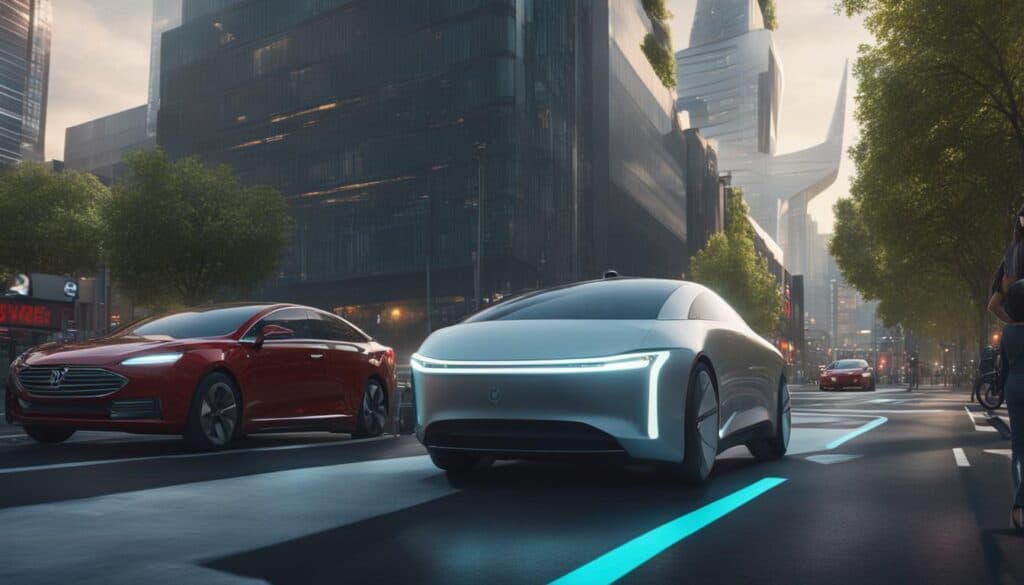
The transportation industry is on the brink of a revolution thanks to artificial intelligence (AI) and advanced technologies. Self-driving cars and AI-powered travel planners are set to transform how people move from one location to another. Although autonomous vehicles are still undergoing improvements, they have the potential to make a significant impact on traffic congestion, fuel consumption, and road safety.
Through AI algorithms and machine learning capabilities, self-driving cars can analyze real-time data to make split-second decisions on the road. These vehicles can navigate traffic, adapt to changing conditions, and minimize the risk of accidents. Additionally, AI-powered travel planners can optimize routes, estimate travel times, and provide personalized recommendations for commuters and travelers.
The integration of AI in transportation not only promises a more efficient and convenient travel experience but also has the potential to revolutionize urban planning. City infrastructures can be reimagined to accommodate autonomous vehicles, resulting in optimized traffic flow and reduced congestion. Furthermore, AI can contribute to reducing carbon emissions by enabling greener transportation alternatives and promoting sustainable practices.
While AI in transportation offers numerous benefits, it is crucial to address concerns regarding data privacy, cybersecurity, and ethical considerations related to decision-making algorithms. Striking the right balance between technological advancements and responsible implementation is key to maximizing the positive impact of AI in the transportation sector.
AI in Manufacturing
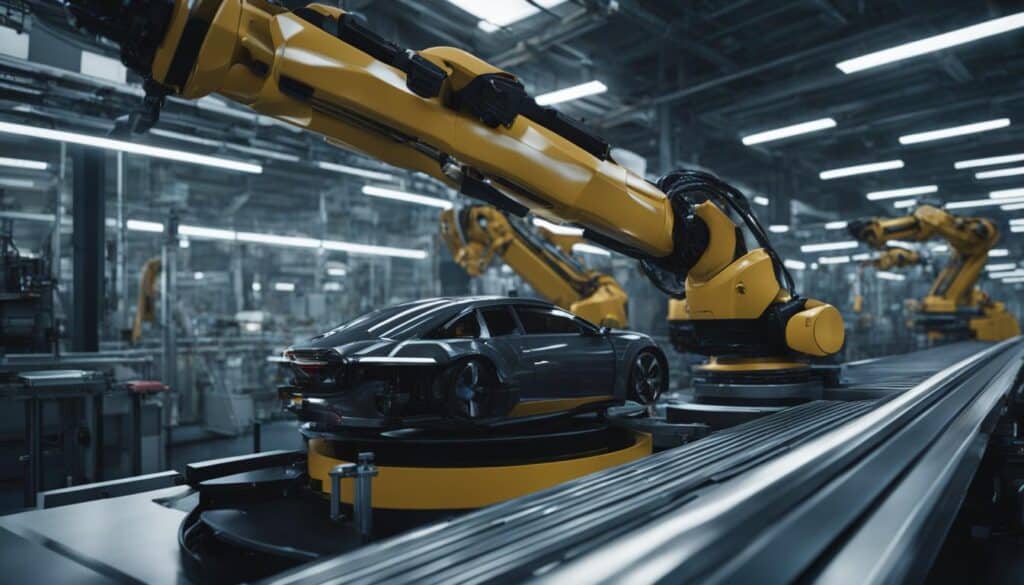
The manufacturing industry has long been reaping the benefits of artificial intelligence (AI) technology. With the integration of AI-powered robots alongside human workers, manufacturing processes have become more efficient and cost-effective. AI algorithms and predictive analysis sensors are optimizing equipment performance, resulting in improved productivity and streamlined operations.
One of the significant advantages of AI in manufacturing is the automation of labor-intensive tasks. AI-driven robots can perform complex assembly tasks with precision and speed, reducing human error and increasing overall production efficiency. This collaboration between humans and AI technology has led to enhanced manufacturing capabilities and a higher level of quality control.
Furthermore, AI technology enables real-time data analysis and predictive maintenance, contributing to the reduction of equipment downtime. By using machine learning algorithms, manufacturers can detect potential equipment failures and address maintenance needs proactively. This proactive approach not only saves costs but also minimizes disruptions in the production process.
AI-powered computer vision systems play a crucial role in the manufacturing industry, providing quality control and inspection capabilities. These systems can analyze vast amounts of visual data and identify defects or inconsistencies in products, ensuring adherence to strict quality standards. The implementation of AI technology in quality control processes not only improves product quality but also reduces the potential for human error.
In addition, AI-powered supply chain management systems optimize inventory levels, demand forecasting, and distribution logistics. By utilizing machine learning algorithms, manufacturers can make data-driven decisions, reducing costs, minimizing waste, and improving overall supply chain efficiency.
The integration of AI technology in manufacturing is revolutionizing the industry, paving the way for smarter factories and improved production processes. With its ability to automate tasks, optimize performance, and enhance quality control, AI is driving innovation and shaping the future of manufacturing.
AI in Healthcare
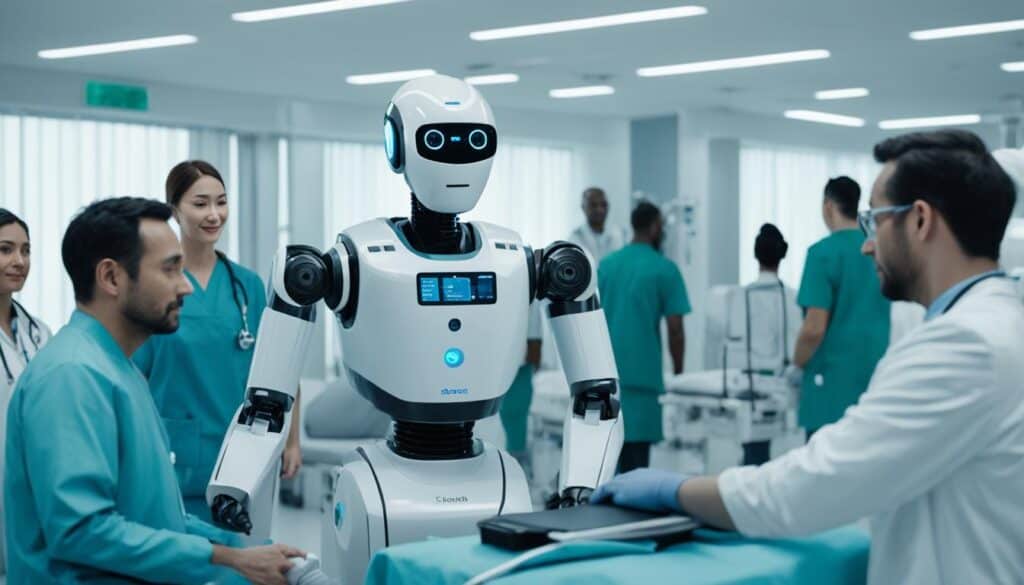
Artificial intelligence (AI) is revolutionizing the healthcare industry, bringing significant advancements in disease identification, drug discovery, and patient care. Through the power of AI, healthcare professionals can harness the potential of big data analysis to identify patterns, provide personalized recommendations, and ultimately improve healthcare outcomes.
Innovative Approaches to Disease Identification
AI algorithms have the ability to process vast amounts of medical data, allowing for faster and more accurate disease identification. By analyzing patient records, lab results, and medical imaging, AI can assist physicians in detecting diseases at an early stage, leading to better treatment outcomes. Additionally, AI-powered diagnostic tools can provide suggestions and insights to support healthcare professionals in making informed decisions.
Streamlining Drug Discovery
AI is spearheading advancements in drug discovery, drastically reducing the time and cost involved in developing new medications. Machine learning algorithms can analyze massive datasets and identify potential drug candidates more efficiently than traditional methods. This accelerated process has the potential to bring life-saving treatments to patients faster, addressing unmet medical needs and improving overall healthcare.
Virtual Nursing Assistants
Virtual nursing assistants powered by AI technology are transforming patient care. These virtual assistants can interact with patients, provide medication reminders, and monitor vital signs remotely. By automating certain aspects of patient care, AI enables healthcare providers to focus their attention on more critical tasks, improving efficiency and patient outcomes.
AI’s rapid evolution in healthcare holds immense promise for the future. Through continued research and application, AI technologies will continue to reshape the healthcare landscape, contributing to improved diagnoses, streamlined drug discovery, and enhanced patient care.
AI in Education
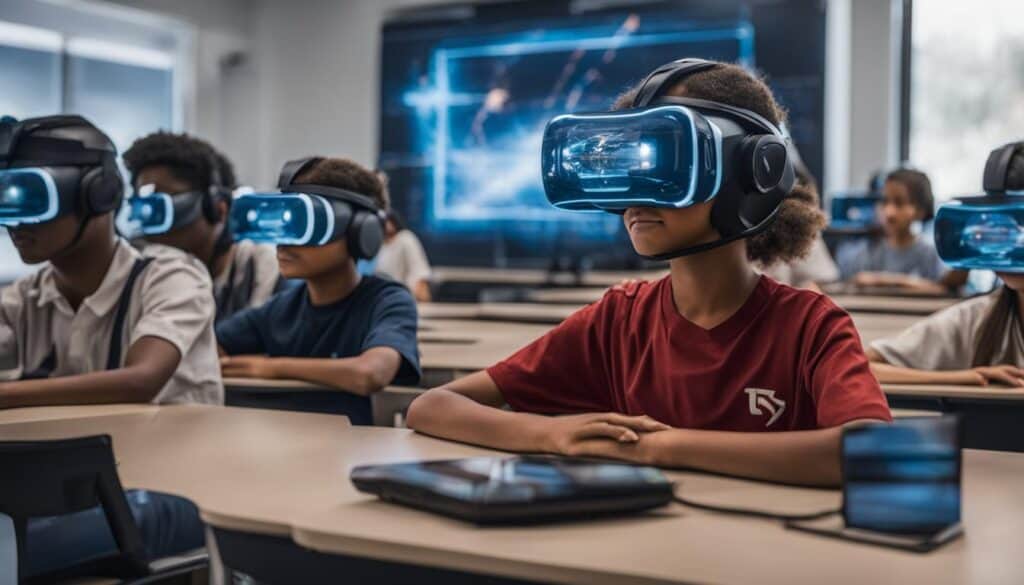
Artificial intelligence (AI) is revolutionizing the education sector, bringing forth exciting possibilities for innovative learning experiences. Through the integration of AI technologies, education is becoming more personalized, efficient, and engaging.
The Power of AI in Education
AI has the ability to digitize textbooks, making educational resources more accessible and interactive. With the help of machine learning algorithms, AI systems can adapt to individual student needs, providing personalized feedback and recommendations to enhance the learning process.
Furthermore, AI can play a crucial role in detecting plagiarism, ensuring academic integrity. It can analyze vast amounts of data, comparing student work against a database of known sources to identify any instances of potential plagiarism.
Enhancing the Learning Experience
AI-powered virtual assistants can provide instant support to students, answering questions and guiding them through their coursework. These assistants can use natural language processing to understand students’ queries and provide accurate responses, making learning more efficient.
Facial recognition technology, another application of AI, can help track students’ attention and engagement levels during online classes. By analyzing facial expressions and gestures, AI systems can provide insights to educators, allowing them to tailor their teaching methods to better meet the needs of individual students.
The role of AI in education is expected to continue expanding in the future. As AI technologies advance, we can expect to see more personalized learning experiences, optimized curriculum development, and adaptive assessments. AI will assist educators in identifying gaps in knowledge and provide targeted interventions to support student progress.
However, it is important to strike a balance between AI and human interaction in education. While AI can automate certain tasks and enhance learning experiences, the guidance and expertise of educators remain invaluable in fostering critical thinking, creativity, and social-emotional development.
AI in Media

Artificial Intelligence (AI) is making significant strides in the media industry, bringing about notable changes, especially in the field of journalism. Automated journalism tools like ChatGPT and Automated Insights are being widely utilized to generate news stories and reports, leveraging the power of AI to streamline content creation.
These AI-powered tools enable journalists to quickly sift through vast amounts of data and generate articles with remarkable speed and accuracy. ChatGPT, for example, can provide answers and insights in complete sentences, facilitating the creation of cohesive and informative news pieces.
However, as AI-generated content becomes more prevalent in journalism, ethical concerns and questions arise. The use of generative AI raises issues about transparency, the authenticity of sources, and bias in reporting. The responsibility to ensure unbiased and reliable information remains a topic of discussion among media professionals.
Despite these concerns, the integration of AI into media has undeniable potential. It can streamline content generation, enhance the speed and efficiency of news reporting, and provide new ways to personalize news experiences for readers.
AI in Customer Service
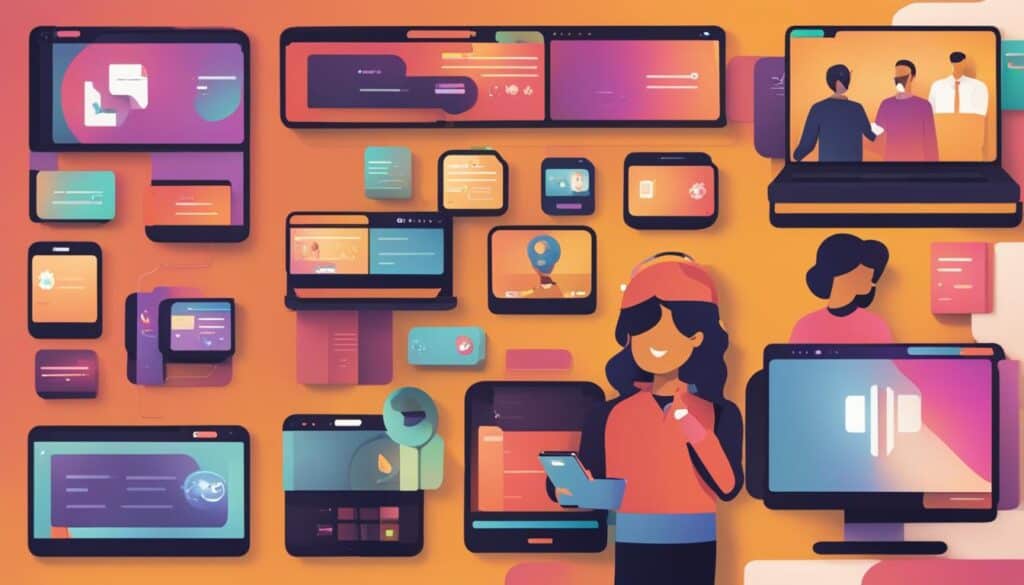
AI-powered chatbots and virtual assistants are revolutionizing customer service by providing data-driven tools and personalized experiences. With the advancements in technology and AI algorithms, businesses can now offer efficient and responsive customer support 24/7.
AI in customer service is becoming increasingly common across various industries. Chatbots are now equipped with natural language processing and machine learning capabilities, allowing them to understand and respond to customer inquiries in real-time.
“AI-powered chatbots have significantly improved our customer service operations. They can handle a large volume of inquiries, provide instant responses, and even offer personalized recommendations based on customer preferences.” – John Smith, Customer Service Manager at XYZ Corporation
One of the key advantages of using AI in customer service is its ability to analyze customer inquiries and sentiment. By analyzing the tone and content of customer messages, AI algorithms can identify patterns and provide meaningful insights to businesses. This helps companies improve their products, services, and overall customer experience.
Additionally, AI-powered virtual assistants can offer personalized experiences by retrieving customer information from databases and suggesting relevant solutions. They can provide step-by-step instructions, troubleshoot common issues, and even initiate outbound communication to keep customers informed about the status of their requests.
With AI in customer service, businesses can streamline their support processes, reduce response times, and enhance customer satisfaction. Customers appreciate the convenience of instant assistance, and companies can allocate their resources more efficiently.
As AI continues to evolve, we can expect even more advanced features such as sentiment analysis, voice recognition, and emotion detection to further enhance the customer service experience. AI is empowering businesses to provide efficient and personalized support, ultimately building stronger relationships with their customers.
The Impact of AI on Society

Artificial Intelligence (AI) has a profound impact on society, both positive and negative. As AI technology continues to advance, it presents various challenges and opportunities that shape our future.
Job Displacement and Ethical Concerns
One of the significant concerns surrounding AI is the potential for job displacement. As AI algorithms and automation become more sophisticated, certain tasks and roles may be replaced by AI systems. This displacement can lead to workforce disruptions and require individuals to seek new job opportunities or develop new skills.
“AI can lead to job displacement and raise ethical concerns, such as bias in AI algorithms.”
Another ethical concern is the potential for bias in AI algorithms. If the data used to train AI systems is biased or lacks diversity, it can result in biased outcomes and perpetuate existing inequalities. Addressing bias in AI algorithms and ensuring fair and equitable decision-making are crucial to harnessing the full potential of AI technology.
Enhancing Decision-Making and Efficiency
On the positive side, AI has the potential to enhance decision-making processes and improve efficiency in various fields. AI-powered systems can analyze vast amounts of data, identify patterns, and provide valuable insights to support informed decision-making.
Personalized Experiences for Users
AI technology enables personalized experiences by leveraging user data and preferences. From personalized recommendations on streaming platforms to chatbots providing tailored customer service experiences, AI enhances user interactions and improves overall satisfaction.
As AI technology continues to advance, it is essential to address the challenges and ethical considerations to ensure a responsible and beneficial integration of AI into society.
How AI Will Change Work
Artificial intelligence (AI) is set to have a significant impact on the nature of work. While it’s true that routine and repetitive tasks will be replaced by AI, resulting in job displacement in certain industries, there is also a silver lining. AI will create new job opportunities in fields that are closely tied to technology and its advancements.
Data science is one such field that will see a surge in demand. With the vast amounts of data being generated, companies need professionals who can extract valuable insights and derive meaningful conclusions from this data. Machine learning engineering is another area that is expected to flourish with the rise of AI. These engineers will leverage AI algorithms to build intelligent systems that can learn and evolve over time.
User experience (UX) design is yet another field that will experience a transformation. With the increasing integration of AI in various products and services, there will be a need for UX designers who can create seamless and intuitive experiences for users interacting with AI-powered systems.
However, it’s important to note that the changing job landscape will require continuous education and retraining. As AI evolves, individuals will need to stay updated with the latest technological advancements to remain relevant in their respective industries. Lifelong learning will become essential to adapt to the changing demands of the workforce.
Exciting opportunities lie ahead as AI continues to shape the future of work. By embracing this technology and acquiring the necessary skills, individuals can position themselves for success in the AI-driven economy.
What does the future hold for AI? Keep reading to explore the near future of AI and its potential impact on various aspects of our lives.
The Near Future of AI
As we look ahead to the near future, there are some exciting tech trends on the horizon that will shape the future of AI and technology. Two areas of AI research that hold great promise are reinforcement learning and generative adversarial networks.
Reinforcement learning is a technique where AI systems learn to make decisions through trial and error. This approach allows AI to continuously improve by receiving feedback and adjusting its actions accordingly. In the future, reinforcement learning could revolutionize fields like sustainability, climate change, and environmental issues. AI models trained using reinforcement learning could help optimize cities by finding the most efficient use of resources and predicting traffic conditions. This can contribute to a more sustainable future by reducing congestion and emissions.
Another area of AI research with future implications is generative adversarial networks (GANs). GANs consist of two neural networks: a generator and a discriminator. The generator creates new content, such as images or text, while the discriminator evaluates its quality. Through an iterative process, these networks work against each other, ultimately producing high-quality and realistic output. In the future, GANs could be used to address various challenges and contribute to advancements in areas like art, design, and entertainment.
Overall, the near future of AI holds great potential for transforming various fields and tackling pressing global issues. With continued advancements in reinforcement learning and generative adversarial networks, we can expect AI to play a significant role in shaping our future, making it smarter, more efficient, and sustainable.
 Fullersears
Fullersears





